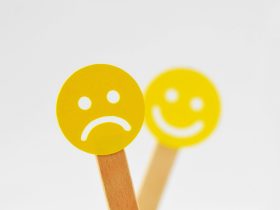Depression is often shadowed by numerous misconceptions, leading to the belief that it’s not a genuine condition or that it selectively impacts specific individuals.
These myths not only deter individuals from seeking necessary help but also perpetuate the stigma encompassing this condition, forcing people to hide it instead of being open about it to friends and family.
In 2020, approximately 8.4% of adults in the United States had at least one episode of major depression, signifying its prevalence as one of the most widespread mental health disorders in the country.
Despite its widespread occurrence, various myths persistently surround depression, primarily stemming from outdated scientific beliefs and cultural or social misunderstandings regarding the condition.
This article aims to unravel some of the most common myths about depression, discuss why they are misleading, and bring the realities behind these misconceptions to light.
Myth 1: Depression is not a real condition
There exists a misconception among some individuals who undermine the legitimacy of depression, considering it as an imagined or invalid medical condition.
This belief often arises from the assumption that depression is a voluntary choice made by individuals or is rooted in specific personality traits.
Moreover, historical perspectives often portrayed depression as mere sadness or a form of self-pity rather than recognizing it as a clinically identifiable and treatable mental health condition.
Facts:
Contrary to these misconceptions, depression is a well-defined and acknowledged condition listed in the Diagnostic and Statistical Manual of Mental Disorders, Fifth Edition (DSM-5). This comprehensive guide outlines the array of emotional and physical symptoms associated with depression.
Diagnosing depression entails meeting specific criteria established within the manual. This involves the persistence of symptoms for a minimum of 2 weeks, significantly impacting a person’s thoughts, emotions, and behaviors.
It’s crucial to understand that depression transcends fleeting sadness or self-pity. Medical professionals attribute depression to a complex interplay of biological, environmental, and psychological factors, emphasizing its multifaceted nature.
These facts substantiate that depression is undeniably a legitimate and prevalent mental health condition, far beyond temporary feelings of sadness or self-indulgence, and it requires proper recognition, understanding, and appropriate treatment.
Myth 2: Medication is the best treatment
There’s a prevalent belief among some individuals that antidepressants stand as the most effective or exclusive treatment for managing depression.
Additionally, it’s commonly assumed that individuals might need to rely on antidepressants for the entirety of their lives to stave off symptoms of depression.
Facts:
Antidepressants, while beneficial for some, do not serve as a universal solution for depression. They may not work for everyone or in every circumstance. Typically, doctors prescribe antidepressants in conjunction with psychotherapy and lifestyle modifications rather than as a standalone treatment.
Contrary to the notion of lifelong medication, it’s rare for doctors to prescribe antidepressants for an individual’s entire life. While some individuals with depression might require long-term use, it’s not the standard practice.
It usually takes several weeks for antidepressants to exhibit their effects. Abruptly discontinuing these medications poses risks due to potential side effects, and hence, it’s crucial to follow a gradual tapering-off approach under the guidance of a doctor or mental health professional.
When an individual’s symptoms have ameliorated, a collaborative plan with their healthcare provider is established to slowly decrease the dosage. Typically, this occurs after at least six months of consistent medication use.
Therefore, antidepressants can be a helpful component in managing depression, but they are not the sole or definitive solution. Treatment often involves a multifaceted approach, combining medication with therapy and lifestyle adjustments tailored to the individual’s needs.
Myth 3: Trauma causes depression
There’s a common misconception that depression is always a direct consequence of a traumatic event.
Facts:
While trauma can act as a potential trigger or risk factor for depression, it is not the sole cause. Depression typically arises from a complex interplay of various factors rather than stemming from a single event.
Moreover, not everyone who experiences trauma will necessarily also deal with depression. This mental health condition can manifest even when life seems relatively stable, which shows that being depressed does not equal being upset. It is something far more complex.
Myth 4: Depression is a part of growing up
In some cases, symptoms often associated with depression, such as oversleeping, irritability, pessimism, and anxiety, might coincide with typical experiences during adolescence. This often leads to the belief that depression is a natural phase of transitioning into adulthood.
Facts:
While it’s true that adolescents can face depressive episodes, it’s essential to differentiate between typical teenage mood fluctuations and clinical depression. Statistics suggest that approximately 17% of American teenagers aged 12–17 experienced major depressive episodes in 2020.
However, prolonged feelings of persistent sadness, irritability, and a loss of interest in previously enjoyed activities can indicate potential depression. Seeking assistance from a trusted adult or a healthcare provider is crucial when these symptoms persist, as not every moody teenager necessarily experiences depression.
Depression is not an inevitable passage into adulthood. Rather than dismissing persistent mood changes as a natural part of growing up, it’s essential to recognize and address any concerning symptoms to ensure appropriate support and intervention for adolescents facing potential mental health challenges.
Myth 5: Depression only affects females
There’s a persistent stereotype perpetuating the belief that depression primarily affects females. While this may seem like a negative thing for women, it also negatively affects men as it leads to the oversight of male depression.
Facts:
Depression does not discriminate based on gender. However, the manifestation and risk factors for depressive episodes may differ between males and females.
Depression in Males
Studies suggest that males experiencing depression may display symptoms such as heightened anger and an increased likelihood of substance use disorder compared to females.
Additionally, cultural expectations around masculinity might discourage males from discussing their emotions openly, potentially hindering them from seeking necessary help.
It’s vital for males exhibiting signs of depression to promptly consult a healthcare professional or mental health expert. This swift action is crucial as research indicates that males facing depression are more prone to suicidal behaviors than females.
Depression in Females
While depression affects individuals regardless of gender, statistics show a higher prevalence among females.
Females may encounter specific forms of depression, including postpartum depression following childbirth. This condition often involves symptoms like anxiety, persistent fatigue, and a continual low mood.
Postpartum depression might emerge due to various factors, including abrupt hormonal shifts during and after pregnancy.
Seeking professional guidance is crucial for those experiencing postpartum depression. The symptoms, ranging from extreme fatigue to overwhelming sadness, can significantly impact both the individual and their ability to care for themselves and their newborn.
Understanding that depression can affect individuals irrespective of gender and recognizing the unique symptoms and risk factors in both males and females is crucial in providing appropriate support and intervention for individuals dealing with depression.
Myth 6: Family history guarantees depression
A prevailing belief exists that if individuals have a family history of depression, they are destined to experience depression themselves.
Facts:
While genetics undoubtedly contribute to depression, it doesn’t guarantee that an individual will develop the condition solely due to a family history.
Research indicates that individuals with a first-degree relative affected by depression have a heightened risk, approximately 2 to 3 times more, of developing depression themselves.
However, having a family history of depression doesn’t ensure the onset of the condition. Conversely, some individuals without a family history may still experience depression.
The development of depression is highly complex and is influenced by various environmental, psychological, and biological factors. Therefore, familial predisposition to depression doesn’t definitively predict its occurrence in an individual.
People grappling with depression might find solace and valuable insights from conversing with family members who understand the challenges associated with the condition.
While family history might contribute to increased susceptibility, it’s not the sole determining factor for depression.
Myth 7: Keeping busy cures depression
Some individuals believe that staying constantly engaged with work, studies, or hobbies can prevent or alleviate depressive episodes.
Facts:
While regular exercise, social interaction, and spending time with loved ones can assist in managing depression, simply busying oneself with activities is not a guaranteed solution to ease depressive symptoms.
Engaging in meaningful activities, hobbies, or projects, particularly as part of cognitive behavioral therapy (CBT) recommended by a therapist, can be beneficial as a facet of depression treatment.
However, during depressive episodes, individuals should approach tasks cautiously. Breaking down significant tasks into smaller, more manageable ones can help reduce feelings of overwhelm.
It’s essential to avoid taking on excessive tasks simultaneously and to focus on a few routine activities during these episodes. Postponing significant decisions or commitments until the depressive episode subsides can lead to more reasoned and objective choices.
Staying occupied can indeed be part of a holistic approach to managing depression, but it’s crucial to employ a balanced strategy that includes therapeutic interventions and self-care practices tailored to the individual’s needs. Simply keeping busy doesn’t directly cure depression and may not effectively address its underlying causes.
Myth 8: Depression develops at a certain age
Another common misconception is that depression predominantly affects adults, emerging mainly in one’s 20s or 30s, and is associated with aging as a natural phase of life.
Facts:
Depression doesn’t adhere to specific age constraints and can manifest at any stage, even in young children.
In older adults, certain severe medical conditions like cancer, heart disease, or Parkinson’s, as well as medications used to treat these ailments, can potentially lead to depression. Some medications, such as those for allergies, blood pressure, and pain, might have side effects that increase the risk of depression.
While it’s more prevalent in older age, it’s crucial to understand that depression is not an expected outcome of aging. Older adults with chronic health conditions or signs of depression should consult their healthcare provider to mitigate the risk or explore treatment options.
Sometimes, healthcare providers might overlook depression symptoms by attributing them to a natural reaction to severe illness.
Myth 9: Talking about depression makes it worse
Due to the stigma surrounding mental health, there’s a misconception that discussing depression can exacerbate the condition.
Facts:
Talking about depression is not detrimental but rather a crucial step in addressing it. Seeking support and discussing one’s feelings with a trustworthy friend, family member, or mental health professional can be highly beneficial.
Evidence-based psychotherapies, including Cognitive Behavioral Therapy (CBT), problem-solving therapy, interpersonal therapy, and acceptance and commitment therapy, are effective in treating depression. Engaging in such therapies involves discussing feelings and emotions, which can significantly help in managing depression.
Encouraging open conversations about mental health and seeking professional help are pivotal steps toward understanding and managing depression effectively.
Myth 10: Herbal supplements can help treat depression
There’s a belief that certain dietary changes or herbal supplements might alleviate depression symptoms when used in conjunction with psychotherapy or medication.
Facts:
While dietary changes can sometimes complement depression treatment, the effectiveness of herbal supplements in treating depression lacks extensive scientific evidence. Some manufacturers claim their products aid in treating depression, leading to queries about their potential to replace established treatment methods.
Only a few herbal supplements have robust scientific support, but some of them can pose serious health risks, particularly when combined with antidepressants, leading to adverse interactions.
Other natural supplements, like omega-3 fatty acids, S-adenosylmethionine, or valerian root, lack substantial evidence supporting their efficacy in treating depression.
Although certain studies suggest these supplements might have some impact on depression, the evidence remains inconclusive.
It’s critical for individuals considering herbal supplements for depression to consult a mental health professional before usage. This ensures informed decisions regarding their mental health treatment and helps avoid potential risks or interactions with other medications.














Find Us on Socials